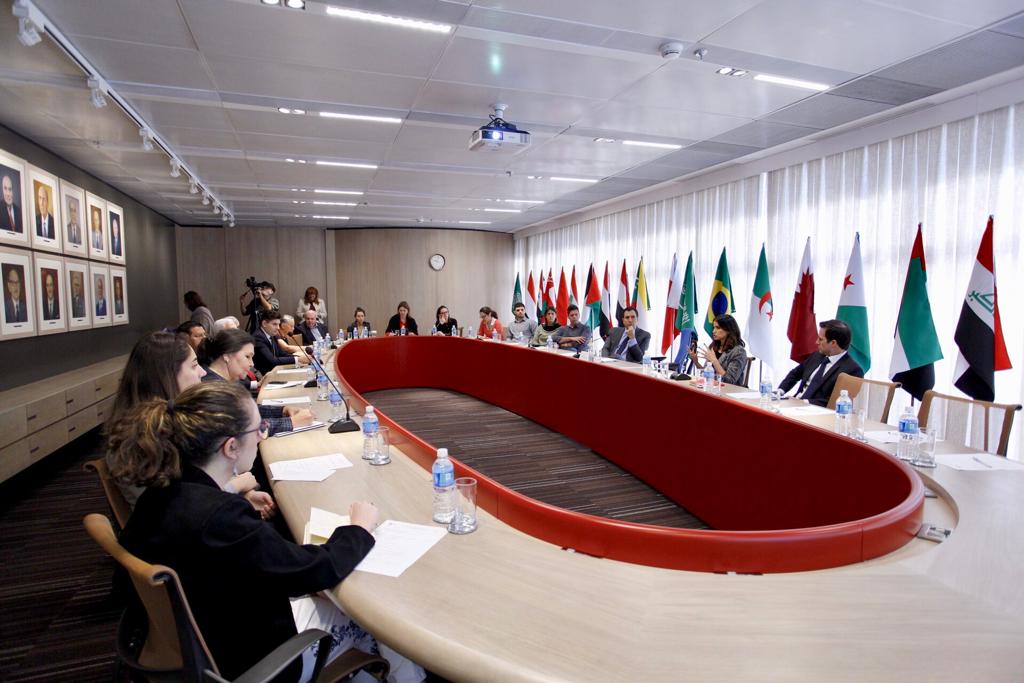São Paulo – Brazilian companies looking to register their trademarks in other countries can go any of several different routes and must pick the best approach for them. So said attorney Mariana Vicentini Taylor (pictured above), an Intellectual Property specialist and partner of law firm Souto, Correa, Cesa, Lummertz & Amaral Advogados, in a workshop at the Arab Brazilian Chamber of Commerce this Tuesday (21).
She told an audience of mostly businesspersons and foreign trade professionals about how to go about registering a trademark on the international market. This can be done via conventions, protocols or organizations valid in several countries or separately in one country alone.

“You need to plan and figure out which countries your business is interested in going to, and then you need to make your searches. Based on your budget and timeframe, you need to determine what level you will make your search at,” said Mariana. By searching out the trademarks registered in a given country, you will find what obstacles might be in place. You can usually have two namesake brands in different industries.
When a company chooses to make a registration in one country only, it must work with local offices. In Brazil, the official organization to this end is the National Institute of Industrial Property (INPI). In most countries, registrations are valid for 10 years and are given to whoever applies first. Some countries, like the United States, require proof of use of trademark before issuing a registration.
Those looking to register a trademark in European Union countries can apply with the European Union Intellectual Property Office (EUIPO). Mariana explains that centralized control can be an advantage, but a problem in one country can affect the entire EU, in which case it’s best to register separately in each country.
Companies can also apply via the Madrid System, which covers 117 countries under the World Intellectual Property Organization (WIPO). In this case, a business will apply in a local office in one of the Madrid System signatory countries and inform which countries it wishes to register its trademark in. The processing of each application, which is known as substantive examination, can take up to 18 months. Brazil is not a signatory, therefore Brazilian businesses can only go this route in case they have operations in a country which is.

Mariana said applying via the Madrid System can greatly reduce costs. She said Brazil is closer to joining the System, and a legislative decree bill is being looked into, with a few adaptations pending. One issue is the 18-month substantive examination, which is not legally in place in Brazil, since it takes the INPI about two years to register a trademark. “They are really working hard on this, but the 18-month processing time is not feasible yet,” she said.
“This would cut costs and paperwork requirements, since an attorney in Brazil would be able to handle the entire process, without the need to hire attorneys in each of the countries – or in one country, in the case of the European Union. This would only be necessary in the event of some topical problem,” she said.
The attorney also mentioned other avenues to registering a trademark abroad, including the African Regional Intellectual Property Organization (ARIPO), comprising mostly English-speaking African countries, and the African Intellectual Property Organization (OAPI), for French-speaking African countries.
Mariana said trademark registration is not mandatory in any country, but said it is key in protecting a brand’s owner. “It ensures the owner exclusive use of a brand for specific goods and services,” she said, adding that registration enables a brand’s owner to take legal action against third parties if need be, or to license a brand to third parties.
The business owners and executives attending the workshop asked several questions. Pharmacist Renata de Carvalho wanted to learn more about registering trademarks in Arab countries. Caio Lopes of Agilise Cosméticos inquired about registering a trademark that has already been registered by someone else, and Nabil Salamé, the Marketing vice president for Abu-Ghazaleh Intellectual Property (Agip), discussed brand registration in the Gulf Cooperation Council (GCC).
The workshop featured a keynote address by Arab Chamber CEO Michel Alaby. The Chamber’s directors William Adib Dib Junior and William Atui were also in attendance.
Translated by Gabriel Pomerancblum




